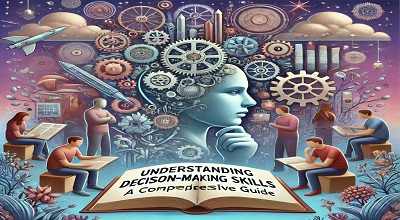Decision-Making Skills
Decision-making is a crucial aspect of everyday life, influencing our personal, professional, and social spheres. Effective decision-making skills are essential for navigating through complex situations and achieving desired outcomes. In this guide, we will explore the latest insights into decision-making skills, their importance, and strategies for honing them.
Understanding Decision-Making Skills
Definition and Importance
- Decision-making skills refer to the ability to select the best course of action from various alternatives based on careful consideration of available information and potential consequences.
- These skills are vital in both personal and professional contexts, as they determine the quality of choices made and the outcomes achieved.
Components of Decision-Making
- Identification of the problem or decision to be made.
- Gathering relevant information and data.
- Evaluating alternatives and considering potential outcomes.
- Making the decision.
- Implementing the decision.
- Reflecting on the decision and learning from the outcomes.
Factors Influencing Decision-Making
Cognitive Biases
- Cognitive biases such as confirmation bias, availability heuristics, and anchoring bias can distort decision-making by leading individuals to rely on limited information or preconceived notions.
- Recognizing and mitigating these biases is essential for making more rational and objective decisions.
Emotional Intelligence
- Emotions play a significant role in decision-making, influencing perceptions, preferences, and risk tolerance.
- Developing emotional intelligence allows individuals to understand and regulate their emotions, leading to more balanced and considered decision-making.
External Pressures
- External factors, such as time constraints, peer pressure, and organizational culture, can impact decision-making processes.
- Building resilience and assertiveness helps individuals maintain clarity and focus amidst external pressures.
Strategies for Improving Decision-Making Skills
Enhancing Analytical Skills
- Develop the ability to critically analyze information, identify patterns, and discern relevant data from noise.
- Practice techniques such as SWOT analysis, cost-benefit analysis, and decision trees to systematically evaluate alternatives.
Cultivating Creativity
- Foster creativity and innovation to generate novel solutions to problems.
- Engage in brainstorming, mind mapping, and lateral thinking exercises to expand creative thinking abilities.
Seeking Diverse Perspectives
- Encourage diversity of thought by seeking input from individuals with different backgrounds, experiences, and perspectives.
- Incorporating diverse viewpoints enhances decision-making by uncovering blind spots and generating a broader range of ideas.
Practicing Mindfulness
- Cultivate mindfulness practices to enhance self-awareness and clarity of thought.
- Mindfulness techniques like meditation and deep breathing help reduce stress, improve focus, and promote better decision-making.
Embracing Failure
- View failure as an opportunity for learning and growth rather than a setback.
- Embracing failure fosters resilience and adaptability, enabling individuals to bounce back from setbacks and make better decisions in the future.
Utilizing Decision-Making Tools
- Leverage decision-making tools and frameworks such as decision matrices, Pareto analysis, and scenario planning.
- These tools provide structured approaches for evaluating options and making informed decisions based on data and analysis.
Conclusion
Effective decision-making skills are indispensable for navigating the complexities of modern life. By understanding the components of decision-making, recognizing influencing factors, and implementing strategies for improvement, individuals can enhance their ability to make sound choices and achieve desired outcomes. Continual practice, reflection, and learning are key to mastering decision-making skills and thriving in an ever-changing world.
